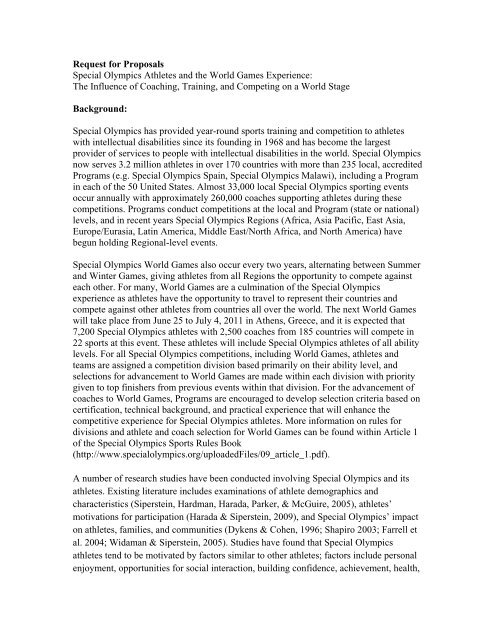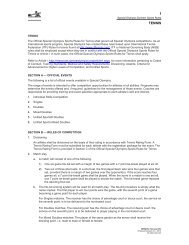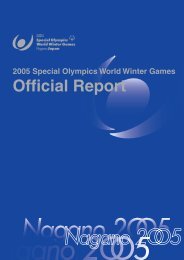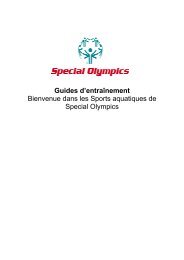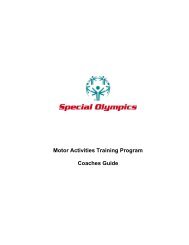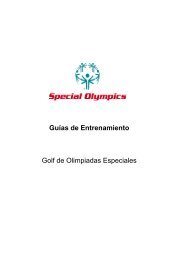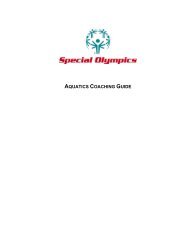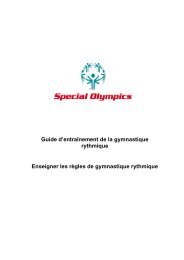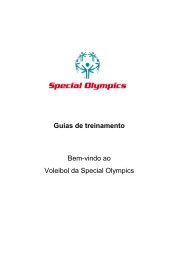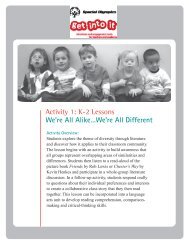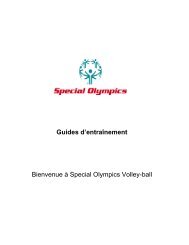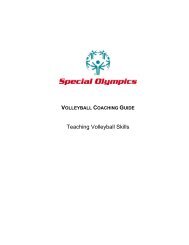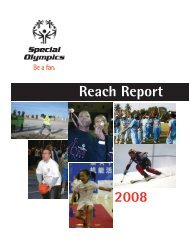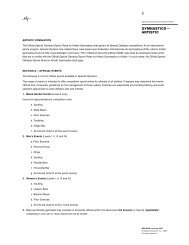Request for Proposals Special Olympics Athletes and the World ...
Request for Proposals Special Olympics Athletes and the World ...
Request for Proposals Special Olympics Athletes and the World ...
Create successful ePaper yourself
Turn your PDF publications into a flip-book with our unique Google optimized e-Paper software.
<strong>Request</strong> <strong>for</strong> <strong>Proposals</strong><br />
<strong>Special</strong> <strong>Olympics</strong> <strong>Athletes</strong> <strong>and</strong> <strong>the</strong> <strong>World</strong> Games Experience:<br />
The Influence of Coaching, Training, <strong>and</strong> Competing on a <strong>World</strong> Stage<br />
Background:<br />
<strong>Special</strong> <strong>Olympics</strong> has provided year-round sports training <strong>and</strong> competition to athletes<br />
with intellectual disabilities since its founding in 1968 <strong>and</strong> has become <strong>the</strong> largest<br />
provider of services to people with intellectual disabilities in <strong>the</strong> world. <strong>Special</strong> <strong>Olympics</strong><br />
now serves 3.2 million athletes in over 170 countries with more than 235 local, accredited<br />
Programs (e.g. <strong>Special</strong> <strong>Olympics</strong> Spain, <strong>Special</strong> <strong>Olympics</strong> Malawi), including a Program<br />
in each of <strong>the</strong> 50 United States. Almost 33,000 local <strong>Special</strong> <strong>Olympics</strong> sporting events<br />
occur annually with approximately 260,000 coaches supporting athletes during <strong>the</strong>se<br />
competitions. Programs conduct competitions at <strong>the</strong> local <strong>and</strong> Program (state or national)<br />
levels, <strong>and</strong> in recent years <strong>Special</strong> <strong>Olympics</strong> Regions (Africa, Asia Pacific, East Asia,<br />
Europe/Eurasia, Latin America, Middle East/North Africa, <strong>and</strong> North America) have<br />
begun holding Regional-level events.<br />
<strong>Special</strong> <strong>Olympics</strong> <strong>World</strong> Games also occur every two years, alternating between Summer<br />
<strong>and</strong> Winter Games, giving athletes from all Regions <strong>the</strong> opportunity to compete against<br />
each o<strong>the</strong>r. For many, <strong>World</strong> Games are a culmination of <strong>the</strong> <strong>Special</strong> <strong>Olympics</strong><br />
experience as athletes have <strong>the</strong> opportunity to travel to represent <strong>the</strong>ir countries <strong>and</strong><br />
compete against o<strong>the</strong>r athletes from countries all over <strong>the</strong> world. The next <strong>World</strong> Games<br />
will take place from June 25 to July 4, 2011 in A<strong>the</strong>ns, Greece, <strong>and</strong> it is expected that<br />
7,200 <strong>Special</strong> <strong>Olympics</strong> athletes with 2,500 coaches from 185 countries will compete in<br />
22 sports at this event. These athletes will include <strong>Special</strong> <strong>Olympics</strong> athletes of all ability<br />
levels. For all <strong>Special</strong> <strong>Olympics</strong> competitions, including <strong>World</strong> Games, athletes <strong>and</strong><br />
teams are assigned a competition division based primarily on <strong>the</strong>ir ability level, <strong>and</strong><br />
selections <strong>for</strong> advancement to <strong>World</strong> Games are made within each division with priority<br />
given to top finishers from previous events within that division. For <strong>the</strong> advancement of<br />
coaches to <strong>World</strong> Games, Programs are encouraged to develop selection criteria based on<br />
certification, technical background, <strong>and</strong> practical experience that will enhance <strong>the</strong><br />
competitive experience <strong>for</strong> <strong>Special</strong> <strong>Olympics</strong> athletes. More in<strong>for</strong>mation on rules <strong>for</strong><br />
divisions <strong>and</strong> athlete <strong>and</strong> coach selection <strong>for</strong> <strong>World</strong> Games can be found within Article 1<br />
of <strong>the</strong> <strong>Special</strong> <strong>Olympics</strong> Sports Rules Book<br />
(http://www.specialolympics.org/uploadedFiles/09_article_1.pdf).<br />
A number of research studies have been conducted involving <strong>Special</strong> <strong>Olympics</strong> <strong>and</strong> its<br />
athletes. Existing literature includes examinations of athlete demographics <strong>and</strong><br />
characteristics (Siperstein, Hardman, Harada, Parker, & McGuire, 2005), athletes’<br />
motivations <strong>for</strong> participation (Harada & Siperstein, 2009), <strong>and</strong> <strong>Special</strong> <strong>Olympics</strong>’ impact<br />
on athletes, families, <strong>and</strong> communities (Dykens & Cohen, 1996; Shapiro 2003; Farrell et<br />
al. 2004; Widaman & Siperstein, 2005). Studies have found that <strong>Special</strong> <strong>Olympics</strong><br />
athletes tend to be motivated by factors similar to o<strong>the</strong>r athletes; factors include personal<br />
enjoyment, opportunities <strong>for</strong> social interaction, building confidence, achievement, health,
<strong>and</strong> competition. Meanwhile, studies examining <strong>the</strong> impact of participating in <strong>Special</strong><br />
<strong>Olympics</strong> on athletes found positive effects. For example, research shows that<br />
approximately 94% of <strong>Special</strong> <strong>Olympics</strong> athletes experience an improvement in sports<br />
skills, <strong>and</strong> more than 90% of <strong>Special</strong> <strong>Olympics</strong> athletes benefited from increased selfesteem<br />
<strong>and</strong> self confidence after participating (Serving <strong>Athletes</strong>, Families <strong>and</strong> <strong>the</strong><br />
Community. The Universal Impact of <strong>Special</strong> <strong>Olympics</strong>: Challenging <strong>the</strong> Barriers <strong>for</strong><br />
People with Intellectual Disability 1 ). These research studies also found that <strong>Special</strong><br />
<strong>Olympics</strong> has a positive impact on both families <strong>and</strong> communities. For example, parents<br />
reported that <strong>Special</strong> <strong>Olympics</strong> had a positive impact on <strong>the</strong>ir perceptions of <strong>the</strong>ir child,<br />
as well as of people with intellectual disabilities in general. There is very limited data<br />
from <strong>the</strong>se studies, however, that speaks to <strong>the</strong> role of <strong>the</strong> coach in <strong>the</strong> <strong>Special</strong> <strong>Olympics</strong><br />
experience. For instance, <strong>the</strong>re is limited data on how coaching philosophy, background,<br />
or training techniques may enhance <strong>the</strong> experience <strong>for</strong> athletes.<br />
Despite this gap in <strong>the</strong> literature on <strong>the</strong> role of <strong>the</strong> coach <strong>for</strong> athletes with disabilities,<br />
significant literature exists on coaching <strong>for</strong> athletes without disabilities. The field has<br />
explored coach characteristics <strong>and</strong> behaviors, as well as athlete <strong>and</strong> team outcomes.<br />
Examples of coaching characteristics/behaviors examined in <strong>the</strong> literature are leadership<br />
style (Chelladurai & Saleh, 1980; Gilbert <strong>and</strong> Trudel, 2004), autonomy-supportive<br />
strategies (Conroy & Coatsworth, 2007), <strong>and</strong> sense of efficacy (Feltz, Chase, Moritz, &<br />
Sullivan, 1999). Researchers also have worked to underst<strong>and</strong> how coaches learn to coach,<br />
as well as what experiences are <strong>the</strong> most important to have in order to gain coaching<br />
expertise (Trudel & Gilbert, 2006; Werthner & Trudel, 2006). The literature also includes<br />
examples of both athlete <strong>and</strong> team outcomes, such as self-esteem (Coatsworth & Conroy,<br />
2009), team cohesion (Shields & Gardner, 1997), <strong>and</strong> fun (Smoll, Smith, Barnett, &<br />
Everett, 1993).<br />
While <strong>the</strong>re is some existing literature on <strong>Special</strong> <strong>Olympics</strong> <strong>and</strong> significant literature on<br />
coaching <strong>for</strong> athletes without disabilities, <strong>the</strong>re is a noticeable gap when looking at <strong>the</strong><br />
crucial role of coaches of sports <strong>for</strong> athletes with disabilities, including in <strong>Special</strong><br />
<strong>Olympics</strong>. This project, <strong>the</strong>re<strong>for</strong>e, will study <strong>the</strong> role <strong>and</strong> impact of <strong>the</strong> coach in <strong>the</strong><br />
<strong>Special</strong> <strong>Olympics</strong> <strong>World</strong> Games experience.<br />
Goals of this Project:<br />
To better underst<strong>and</strong> <strong>the</strong> role <strong>and</strong> impact of <strong>the</strong> coach in <strong>the</strong> <strong>Special</strong> <strong>Olympics</strong> <strong>World</strong><br />
Games experience, this project aims to:<br />
a. Gain an underst<strong>and</strong>ing of <strong>the</strong> <strong>World</strong> Games experience <strong>for</strong> <strong>Special</strong><br />
<strong>Olympics</strong> athletes.<br />
1 www.specialolympics.org/research_studies.aspx
. Elucidate <strong>the</strong> role of coaches in athletes’ <strong>World</strong> Games experience,<br />
including <strong>the</strong>ir role during selection, training, <strong>and</strong> competition.<br />
Research Questions:<br />
c. Exp<strong>and</strong> <strong>the</strong> knowledgebase in <strong>the</strong> field of sports <strong>and</strong> coaching to include<br />
research with athletes with disabilities.<br />
The proposed research should examine <strong>the</strong> impact of coaching on athletes by focusing on<br />
one or more of <strong>the</strong> following questions:<br />
Project Design:<br />
a. What is <strong>the</strong> <strong>World</strong> Games experience <strong>for</strong> <strong>Special</strong> <strong>Olympics</strong> athletes, from<br />
selection to competition? What sort of relationships develop between coach<br />
<strong>and</strong> player <strong>and</strong>/or among teammates?<br />
b. How, <strong>and</strong> to what extent, does participation in <strong>the</strong> <strong>World</strong> Games impact an<br />
athlete, not only involving sports skills but also social, motivational, health,<br />
<strong>and</strong>/or behavioral outcomes? What do athletes gain from <strong>the</strong> <strong>World</strong> Games?<br />
Are <strong>the</strong>re certain characteristics (e.g. skill level, functioning level, etc.) of <strong>the</strong><br />
athletes or teams that play a role in <strong>the</strong> breadth <strong>and</strong> depth of impact?<br />
c. What is it about <strong>the</strong> <strong>World</strong> Games experience (e.g. being away from<br />
home, representing one’s country, media exposure, cultural awareness, etc)<br />
that can lead to a discernable impact on athletes <strong>and</strong>/or teams?<br />
d. What is <strong>the</strong> role of <strong>the</strong> coach in moderating <strong>the</strong> influence of <strong>the</strong> <strong>World</strong><br />
Games? Do certain characteristics of coaching behavior <strong>and</strong> leadership style<br />
influence athletes’ experiences? How does a coach’s approach to training <strong>and</strong><br />
competition affect <strong>the</strong> <strong>World</strong> Games experience <strong>for</strong> an athlete?<br />
Selection of Delegations 2 to attend <strong>World</strong> Games will start in May 2010 <strong>and</strong> go through<br />
December 2010; timing will depend on <strong>the</strong> delegation. This study will follow select<br />
delegations from <strong>the</strong> point of selection <strong>for</strong> <strong>World</strong> Games through training <strong>for</strong> <strong>and</strong><br />
competition in A<strong>the</strong>ns. It is suggested that 3-6 delegations be selected, but this number<br />
may vary depending on <strong>the</strong> study design. As <strong>the</strong> host of <strong>the</strong> <strong>World</strong> Games, Greece<br />
must be one of <strong>the</strong> delegations selected. Factors, such as type of sport, different<br />
competition divisions, <strong>and</strong> delegation size, should be considered when selecting<br />
delegations.<br />
2 Delegations represent athletes competing on behalf of a single country, <strong>for</strong> example Team USA or <strong>the</strong><br />
Greek Delegation. Within a delegation, <strong>the</strong>re may be several teams, e.g. SO Kenya may have a gymnastics<br />
team, a football team, <strong>and</strong> an Aquatics team at <strong>the</strong> Games. Applicants are not required to follow all teams<br />
within a delegation.
It is likely that additional data on coaches will be intramurally collected by SOI at 2010<br />
Regional events while this RFP is out to bid. These data will be shared with <strong>the</strong> awarded<br />
researcher(s) <strong>and</strong> hopefully will help in<strong>for</strong>m <strong>the</strong> study.<br />
Design considerations:<br />
There are several places where variability will be introduced, such as -<br />
o Cultural differences<br />
o Type of sport (team or individual; timed or judged)<br />
o Division / skill level<br />
o Coaches’ past experiences<br />
o <strong>Athletes</strong>’ past experiences<br />
o Size of delegation<br />
o Gender <strong>and</strong> Age<br />
Grant Amount: One grant award will be made <strong>for</strong> no more than $175,000. The duration<br />
of <strong>the</strong> project will be 18 months <strong>and</strong> <strong>the</strong> grant will be a one-time award that may be used<br />
<strong>for</strong> all federally allowable <strong>and</strong> reasonable costs directly related to <strong>the</strong> project. The PI on<br />
this project will be asked to present preliminary findings one year into <strong>the</strong> project at <strong>the</strong><br />
2011 <strong>World</strong> Games in A<strong>the</strong>ns. A final report will not be due until after <strong>the</strong> Games, at <strong>the</strong><br />
conclusion of <strong>the</strong> project, when all data have been collected <strong>and</strong> analyzed. As per <strong>Special</strong><br />
<strong>Olympics</strong> International’s longst<strong>and</strong>ing policy, no indirect costs may be covered by this<br />
grant. Monies can be used to sub-contract or partner with local universities to help with<br />
data collection ef<strong>for</strong>ts.<br />
Eligibility <strong>for</strong> Grant: Applicants must have a faculty appointment at an accredited U.S.<br />
or international University, or serve in a senior research position within a nonprofit/NGO.<br />
Ideal applicants will have expertise in issues related to sports <strong>and</strong>/or disability <strong>and</strong> <strong>the</strong><br />
skills, knowledge, <strong>and</strong> resources to carry out this multi-national project.<br />
Deadline: Those applicants interested in submitting a proposal should send it in by April<br />
2, 2010 to:<br />
Amy Harris, MPH<br />
Manager, Research & Evaluation<br />
<strong>Special</strong> <strong>Olympics</strong><br />
1133 19 th St NW<br />
Washington, DC 20036<br />
aharris@specialolympics.org<br />
Criteria <strong>for</strong> Award: Interested applicants will be required to submit a proposal<br />
responsive to <strong>the</strong> above RFP. This proposal must include <strong>the</strong> following:<br />
I. Cover letter<br />
II. Cover page which contains <strong>the</strong> following:<br />
a. Title of Project
. Name, address, telephone number, <strong>and</strong> email address of <strong>the</strong> applicant<br />
c. Total funding amount request<br />
III. Detailed Project Description<br />
a. Description of overall project objectives<br />
b. Description of design, approach, <strong>and</strong> timeline <strong>for</strong> project<br />
c. Plan <strong>for</strong> data analysis<br />
d. Management plan (including project staffing <strong>and</strong> roles, plan <strong>for</strong><br />
coordinating with <strong>Special</strong> <strong>Olympics</strong> or o<strong>the</strong>r stakeholders)<br />
e. Description of available resources (such as support from applicant<br />
organization <strong>and</strong> demonstrated commitment of prospective partners)<br />
IV. Qualifications of <strong>the</strong> PI (include CV)<br />
V. Budget Narrative<br />
VI. Budget Sheet<br />
The proposals will be reviewed by a team of external faculty peer reviewers with relevant<br />
expertise <strong>for</strong> this project. <strong>Proposals</strong> should be no more than 20 pages (CV not included in<br />
page count), 1.5 spaced.<br />
Criteria in selection grantee will be <strong>the</strong> soundness of <strong>the</strong> project design <strong>and</strong><br />
implementation plan, responsiveness of <strong>the</strong> proposal to <strong>the</strong> goals <strong>and</strong> research questions<br />
stated in this RFP, <strong>the</strong> qualifications of <strong>the</strong> PI, <strong>and</strong> <strong>the</strong> reliability of its outcomes<br />
assessment protocol. Strong proposals will provide a literature review <strong>and</strong> a conceptual<br />
model relevant to <strong>the</strong> research questions, will build on previous related work by <strong>the</strong> PI,<br />
will reflect an awareness of <strong>Special</strong> <strong>Olympics</strong>, <strong>and</strong> will contain a sufficient <strong>and</strong> realistic<br />
management plan. Maximizing geographic diversity in selected delegations is desirable,<br />
within <strong>the</strong> constraints posed by <strong>the</strong> budget, timeline <strong>and</strong> design. The awarded Project will<br />
require review by <strong>the</strong> applicants’ Institutional Review Board <strong>and</strong> will be subject to <strong>the</strong>ir<br />
approval.<br />
This grant is supported by funds from <strong>the</strong> U.S. Centers <strong>for</strong> Disease Control <strong>and</strong><br />
Prevention through Cooperative Agreement #5U01DD000302<br />
For fur<strong>the</strong>r in<strong>for</strong>mation or questions:<br />
Amy Harris, MPH: phone (202) 824-0217; fax (202) 824-0323; email<br />
aharris@specialolympics.org


